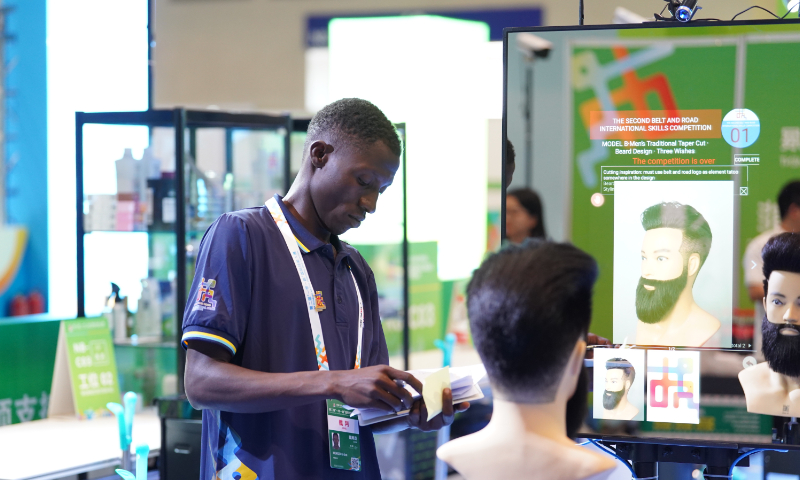
A competitor at the second Belt and Road International Skills Competition (BRISC), which kicks off on June 24, 2024 in Southwest China's Chongqing Municipality. Photo: Courtesy of BRISC
A skills competition for talent from countries and regions participating in the China-proposed Belt and Road Initiative (BRI) kicked off on Monday. Analysts and participants pointed out that the competition is more than a platform for skills exchanges - it's also a venue for deep cooperation of BRI partners in talent training.
The second Belt and Road International Skills Competition (BRISC) is taking place from Monday to Wednesday in Southwest China's Chongqing Municipality. The competition brings together skilled elites from 61 countries and regions to exchange their skills and experience, and jointly promote the development and innovation of vocational skills, the Global Times learned from the organizer.
Jarvis Yiu, a competitor from the Hong Kong Special Administrative Region, told the Global Times on Monday that he hopes to exchange skills with pastry chefs from all over the world through the broad platform of the BRISC.
"It is believed that with the growth of spending power, there are excellent prospects in China's pastry market. Sugar art is my passion and also my career," said Yiu.
There are 18 skills competitions: including digital construction, logistics and freight forwarding, electronics, electrical installations, optoelectronic technology, information network cabling, patisserie and confectionery operations, automobile technology (new energy), unmanned aerial vehicle maintenance, industrial robot system operation, Internet of Things installations and debugging, coffee making, and internet marketing.
The 18 competition projects are closely aligned with the current technological development trends and the industrial development needs of BRI participants, Gu Xiaosong, dean of the ASEAN Research Institute of Hainan Tropical Ocean University, told the Global Times on Monday.
"Skilled workers and technicians are crucial to support the sustainable development of BRI projects apart from investment. The competition will promote knowledge exchanges and improve the quality of labor forces, which is conducive to the development of local enterprises," said Gu.
Technology related to the new-energy vehicle (NEV) sector became the main content of the automobile technology competition for the first time, providing competitors from different countries and regions with the opportunity to show their skills, Li Lei, chief judge of NEV intellectualization for the BRISC, told the Global Times on Monday.
"China can display its NEV technologies through the competition, which can promote exchanges and cooperation among BRI partner economies," said Li.
The first BRISC was held in May 2019. It attracted competitors and experts from 44 countries and regions, and established a platform for cooperation and friendship on skills, the organizer said.
Industrial robot system operation is being included in the BRISC for the first time, in view of the high professionalism required during operations, a wide range of applications and strong international participation, Qiu Qing, executive deputy judge for the BRISC's industrial robot system operation competition, told the Global Times on Monday.
The competition for industrial robot system operation will be held on Tuesday, with competitors from 12 countries including Russia, Thailand, Liberia and Lesotho.
"Competitors from some economies had never seen robotic equipment outside their home countries before. After two days of vocational skills training before the competition, they have a strong interest in China's industrial robot production.
"Some countries have already contacted domestic robotic equipment manufacturers, hoping to import China's advanced equipment," said Qiu.
It is hoped that the competition can help technicians and workers improve the operating level of robot-integrated equipment, while promoting the matching of international standards, as the performance and operations of industrial robots used in various places are inconsistent, Qiu noted.
By holding such a competition, China sends a clear signal to the world: In the process of advancing the BRI, China not only pays attention to the construction of hardware, such as infrastructure, but also to the construction of software such as talent training and skills upgrading, Wang Peng, an associate research fellow at the Beijing Academy of Social Sciences, told the Global Times on Monday.
"This approach will undoubtedly inject more lasting impetus into the long-term development of BRI participating countries and regions," Wang noted.
Some of the flagship projects have already showcased the broader implications of the BRI beyond the provision of public goods.
In addition to infrastructure in areas such as transportation and energy, jointly constructed industrial parks and economic cooperation zones are also landmark projects of the BRI, which have played significant roles in promoting investment, trade and job creation in the host countries.
China has organized many BRI-backed training workshops on skills such as electrical installation, electronics and beauty therapy in many countries, aiming to help develop vocational skills.
The Sihanoukville Special Economic Zone (SSEZ) in Cambodia, a joint venture between Chinese and Cambodian investors under the BRI, had accommodated more than 170 companies from China, the US, Europe, Southeast Asia and other regions as of the end of 2023, generating nearly 30,000 jobs, according to a report by the Xinhua News Agency, citing the SSEZ's operator.
By 2030, BRI-related projects and investments could lift 7.6 million people out of extreme poverty and 32 million others out of moderate poverty, according to an estimate by the World Bank.




